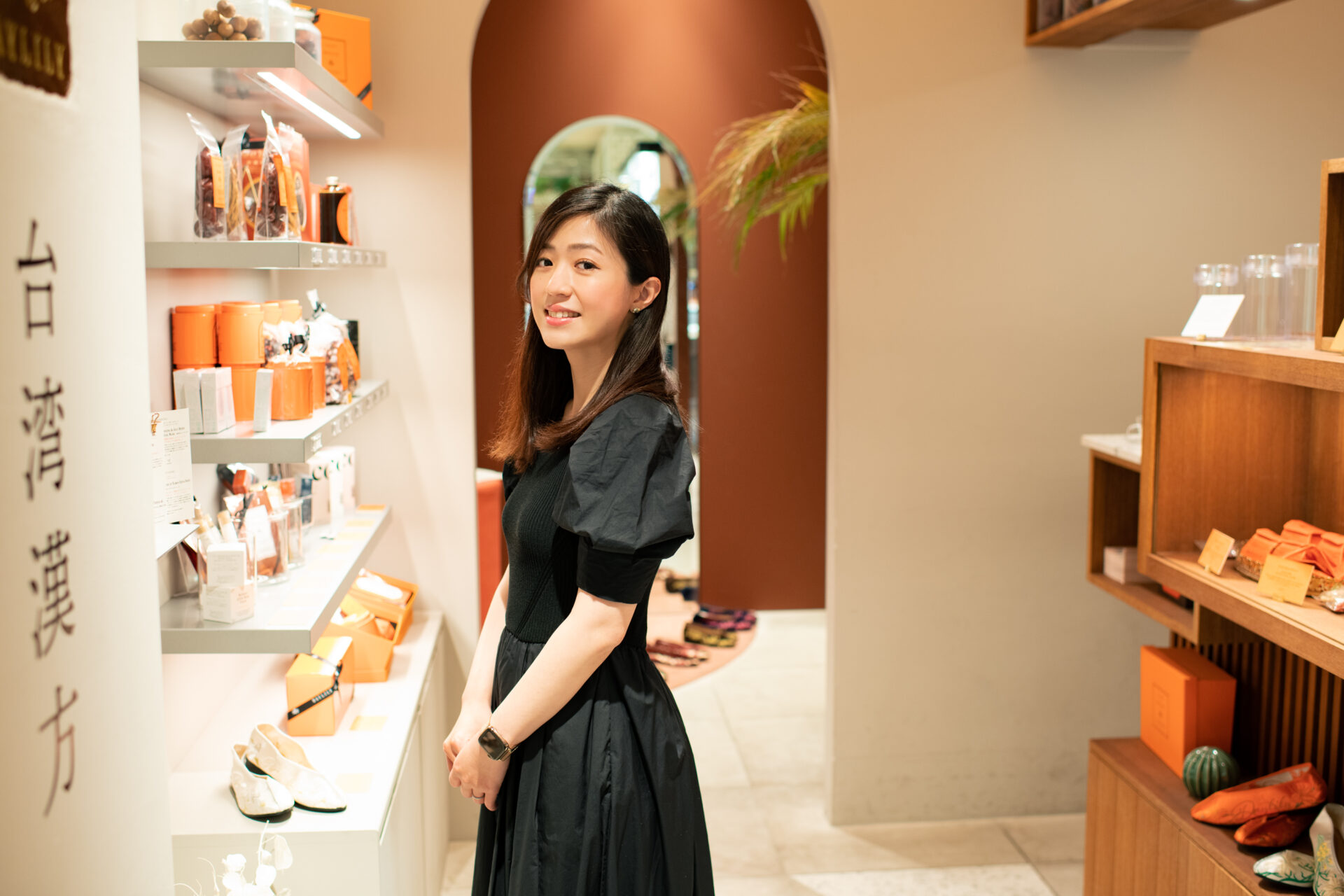When you hear of traditional Chinese medicine, what comes to mind? Some people may think about the unique smells and bitter tastes that are often characteristic of traditional Chinese medicine.
In Japan, traditional Chinese medicine is called “kampo,” and it has evolved in its own way after being introduced from China. Daylily, a lifestyle brand specializing in kampo, has recently been attracting the attention of younger consumers.
Yi-Ting Wang is the founder and COO of Daylily. She grew up as the daughter of a kampo pharmacy near Songshan Airport in Taipei, Taiwan.
Kampo has been an integral part of her life since childhood. We spoke with Wang about the traditions of Taiwanese kampo and how it caters to each individual’s life stages.
From hotpot to dessert, kampo is part of Taiwanese daily life
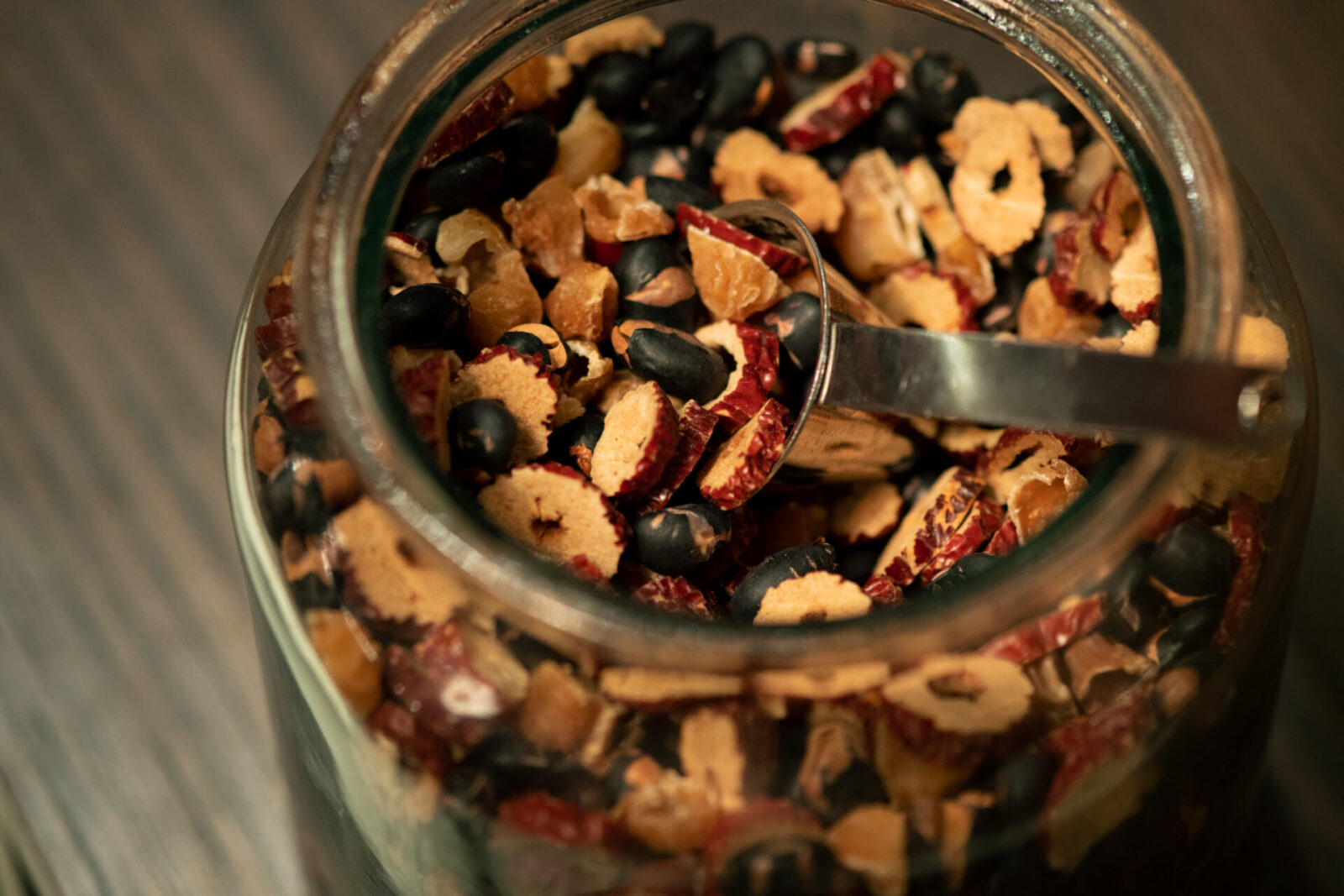
Kampo is a medicine that is made by combining different natural ingredients that are derived from plants, animals and minerals. In Japan, kudzu tea is a popular remedy for colds and shoseiryuto is a well known medicine for bronchitis.
Wang says that in Taiwan, they sometimes add additional and unique ingredients to traditional Chinese formulas.
She explained that in Taiwan the concept of kampo is based on the idea that medicine and food play an equal role in health.
“In Japan, I think people see kampo as mostly a medicine or remedy. In Taiwan, however, there is a broader understanding of it. Everyday foods and drinks, from Taiwanese sweets like douhua shaved ice, to foods such as hot pot and herbal soups, contains ingredients that are found in kampo.”
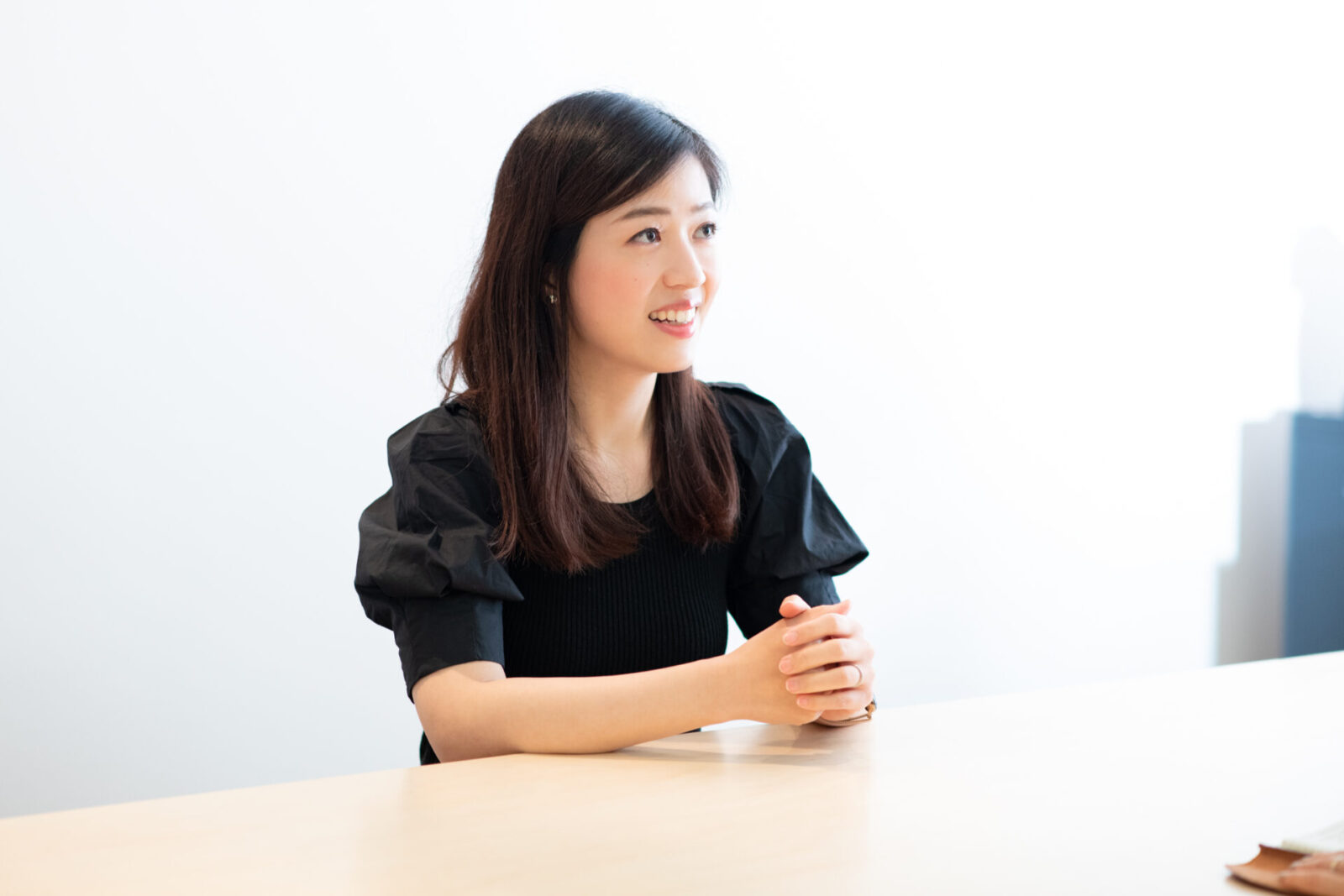
Many people experience fatigue, lack of appetite or overall discomfort in their daily lives that are not necessarily rooted in a diagnosable disease.
Kampo is a way to help people deal with these physical ailments through diet. It supports mental and physical health so that we can lead a more vibrant life.
“In Taiwan, if you want to improve the condition of your stomach, you eat a soup called ‘si shen tang (four spirits soup).’ After eating very oily foods, we drink ‘suanmeitang” (sour plum drink).’ Kampo is used to upkeep a healthy body and it is a natural part of our daily lives.”
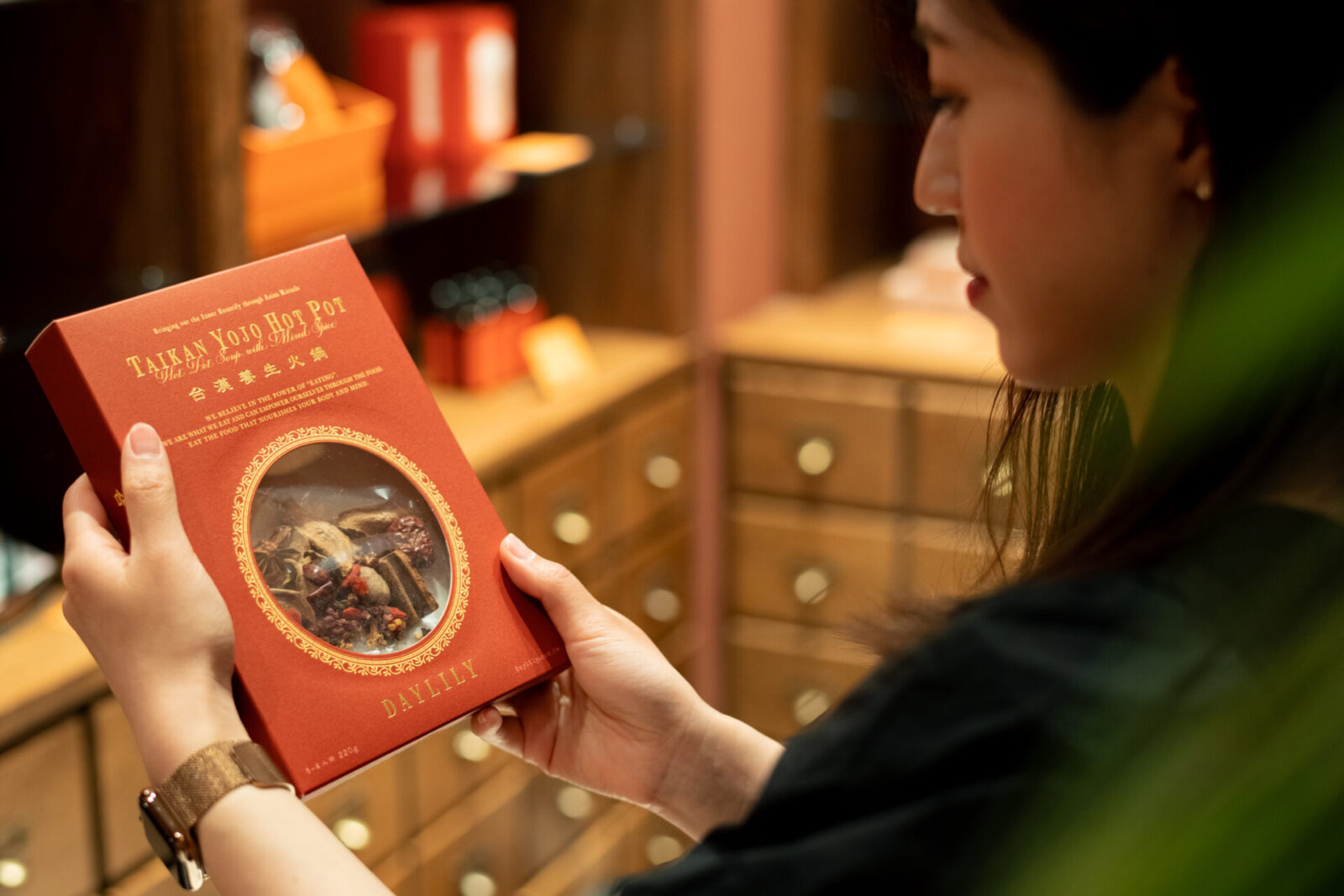
At the heart of healthy living in Taiwan, there are kampo pharmacies
Many of Wang’s childhood memories were shaped by her family’s kampo pharmacy business.
“My father would often make decoctions in the shop, so when I went to school my friends would say I smell like decoctions. I remember being embarrassed by this. My mother would grow kampo plants in our garden. She would use these medicinal herbs in her cooking and show me her ginseng plant. I think it was her way of teaching me about kampo. Kampo was always a close part of my daily life growing up.”
Whenever Wang came home from school, she would find her father talking to his customers at the shop. Using hints that he gathered from these casual conversations, he would search for the cause of the customer’s ailment and change the prescribed kampo medicine. Wang didn’t realize until she was an adult that her father was supporting the health of his customers through these daily conversations.
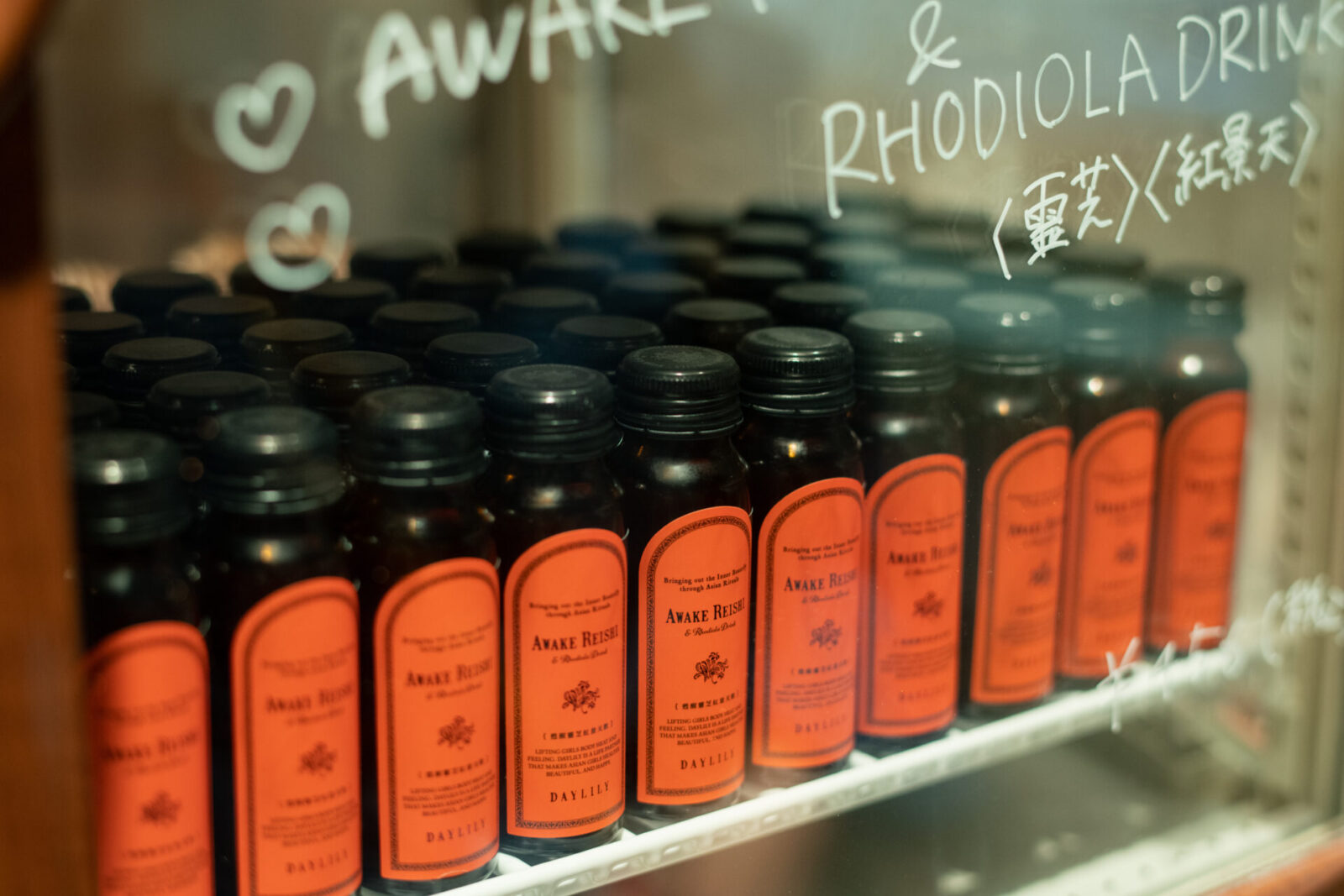
Kampo is integrated into daily life in Taiwan. One can find medicinal drinks and soups on the shelves of convenience stores or in the night markets.
Wang never realized how integrated kampo was in her daily life until she came to Japan to study for university. She was surprised to find that she could not find a place near her home where she could easily buy kampo. She found herself worried about how she would get by without it and it made her realize just how vital kampo was in her life.
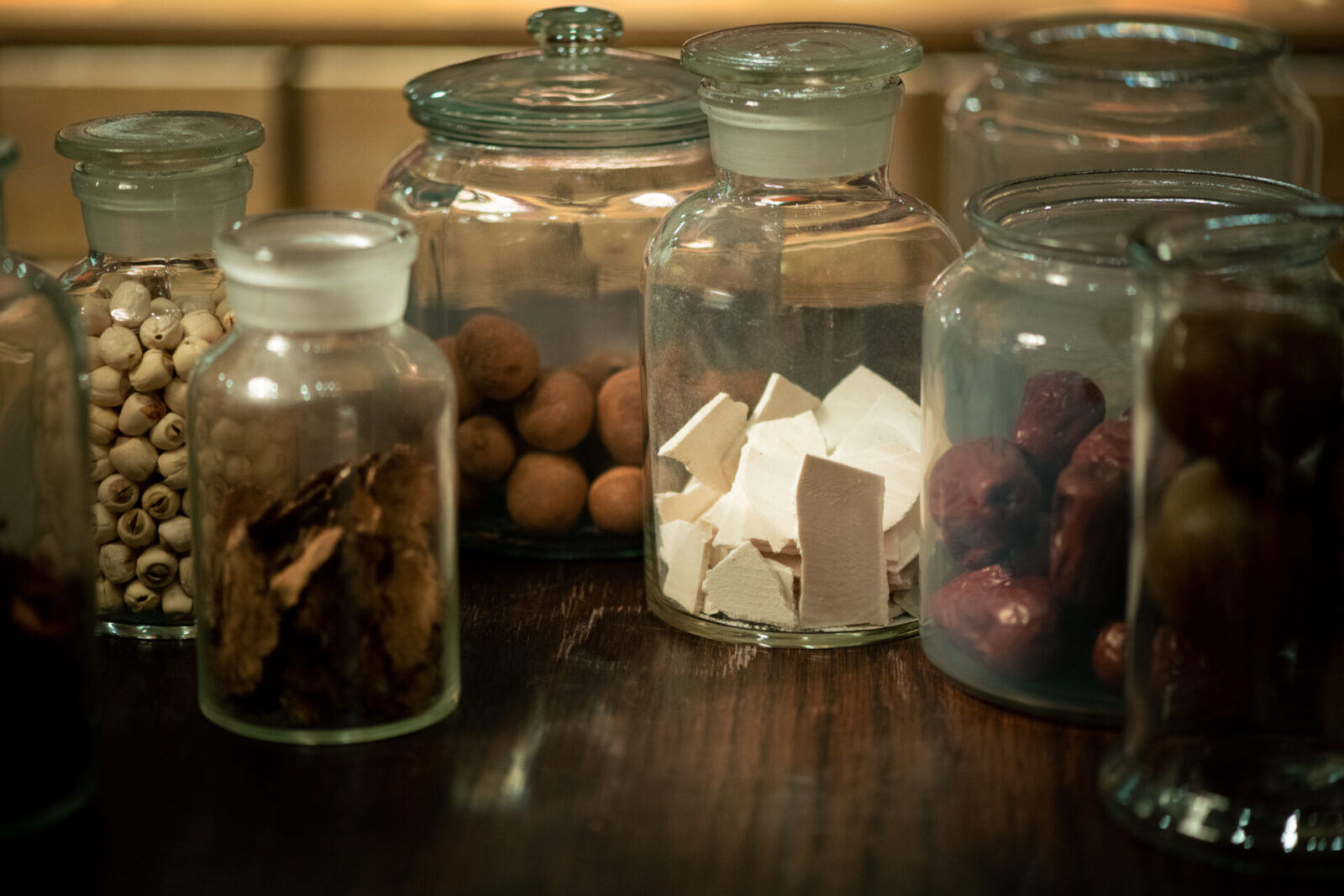
While kampo is well integrated in the daily lives of Taiwanese people and Wang realized its value, she also found that many people of her generation regarded kampo as being old fashioned. Although there are still many kampo pharmacies in Taiwan, they are regarded as shops for older people.
In hope of promoting the benefits of kampo to younger generations, Wang opened the first Daylily shop next to her father’s pharmacy in March 2018.
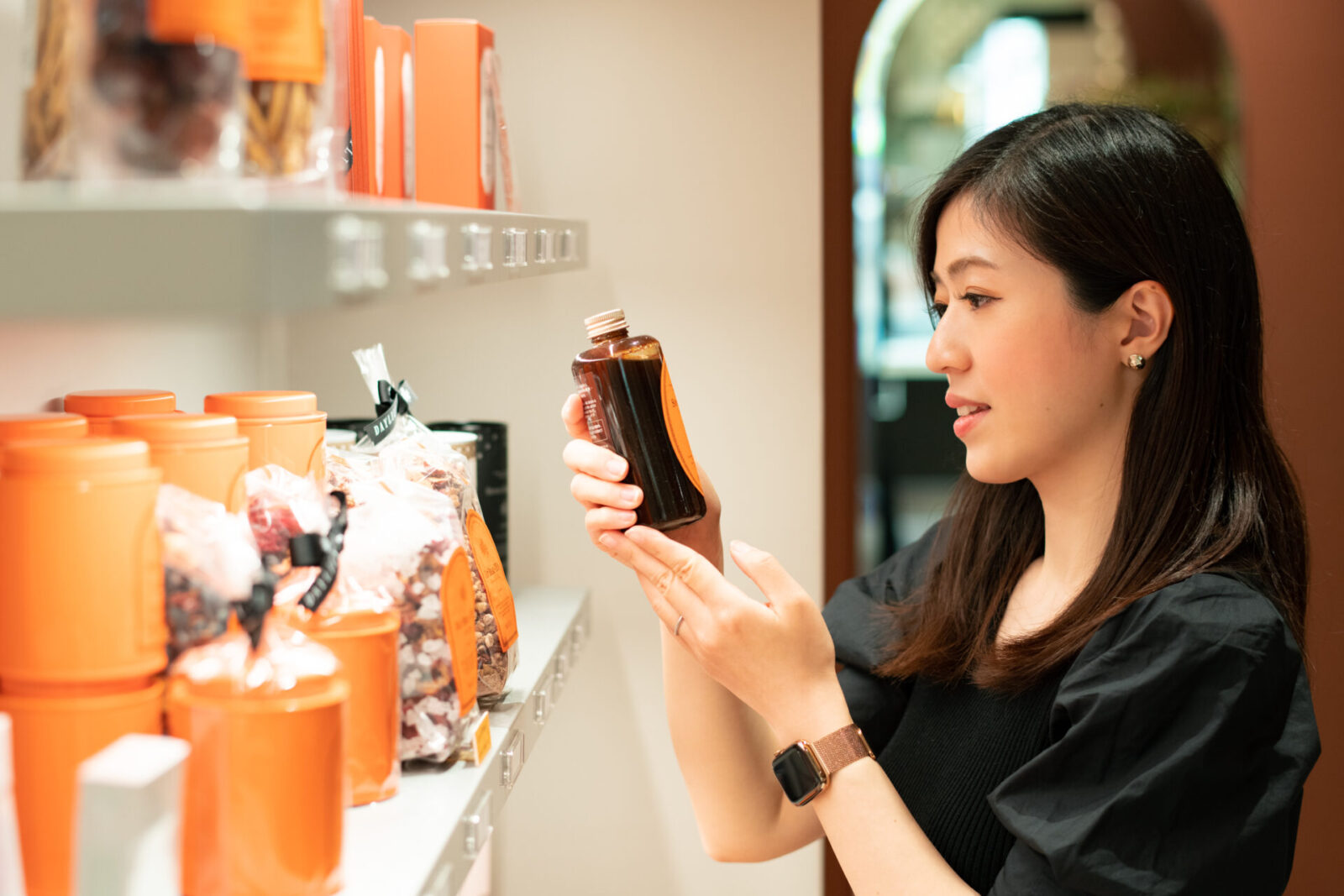
“When we opened our first shop, we found that many tourists from Japan would buy our products and the word spread. Currently, we have one shop in Taiwan and six in Japan. We have ‘sisters’ at each of our shops that our customers can have in-depth conversations with regarding their needs and concerns.”
Wang calls her Daylily staff “sisters.” Her hope is that the staff can form trusting relationships with their customers through casual conversation, much like how her father communicated with his customers.
“At Daylily, we always teach our sisters the importance of conversation in creating a comfortable experience for our customers.”
“There are things that online reviews cannot convey about a shop. I believe we can get the younger populations of Japan and Taiwan more interested in kampo if we explain the benefits they can expect from it better and show them how they can incorporate kampo into everyday life.”
Good medicine tastes bitter, but does kampo have to?
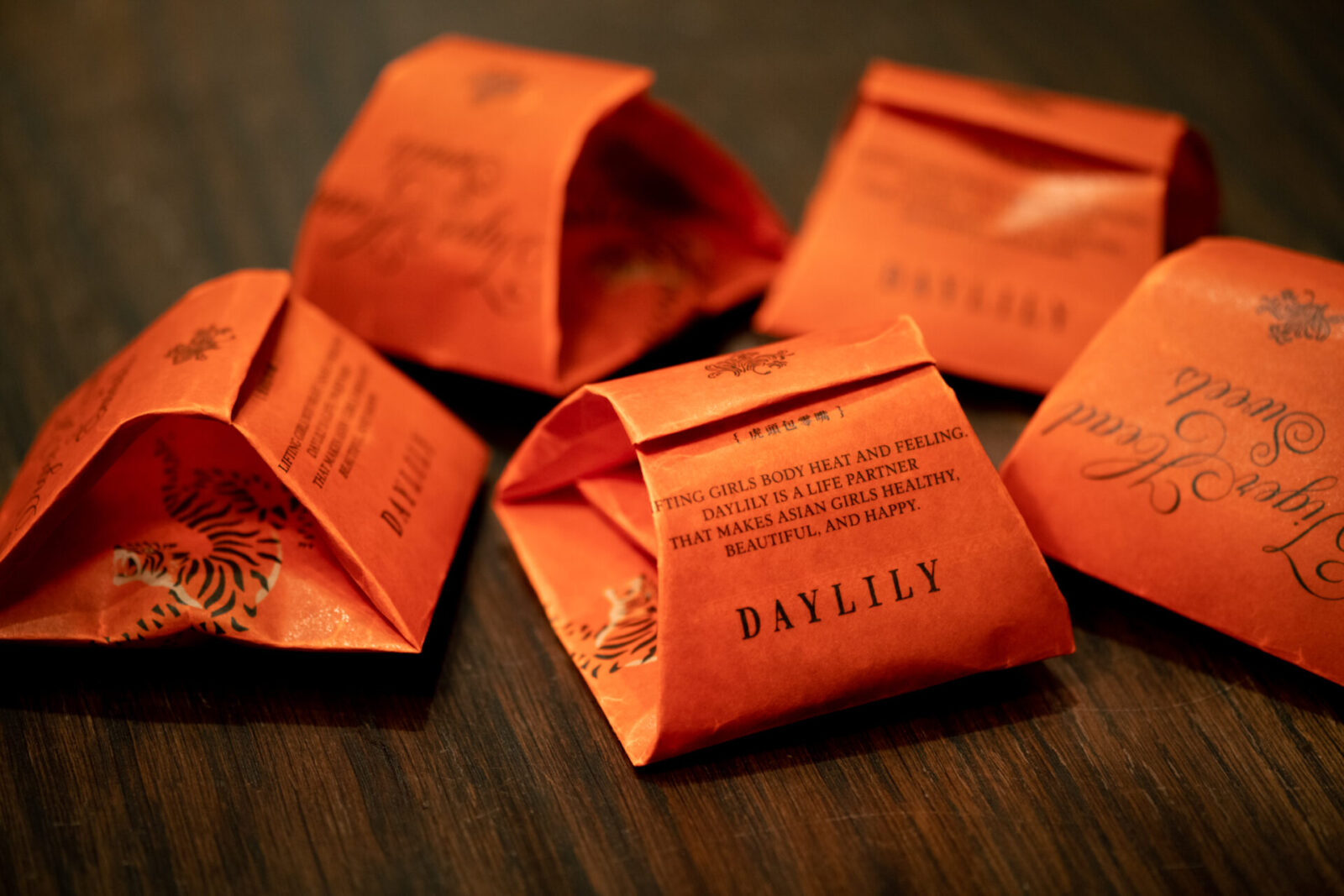
Wang and the Sisters research ways of incorporating kampo in everyday life that taste better and are easier to prepare than decoction.
As an old saying goes, “Good medicine tastes bitter to the mouth.” The decoction of kampo is both time consuming and bitter. Hence, many people hold the preconception that Kampo is a bitter medicine.
“Before the coronavirus pandemic, we held an event at Songshan Cultural and Creative Park in Taiwan. When we explained to younger people that the kampo available today are much easier to drink, many people showed interest. Unlike the decoction process of the past, kampo today can be prepared simply by diluting it or melting it in hot water.”
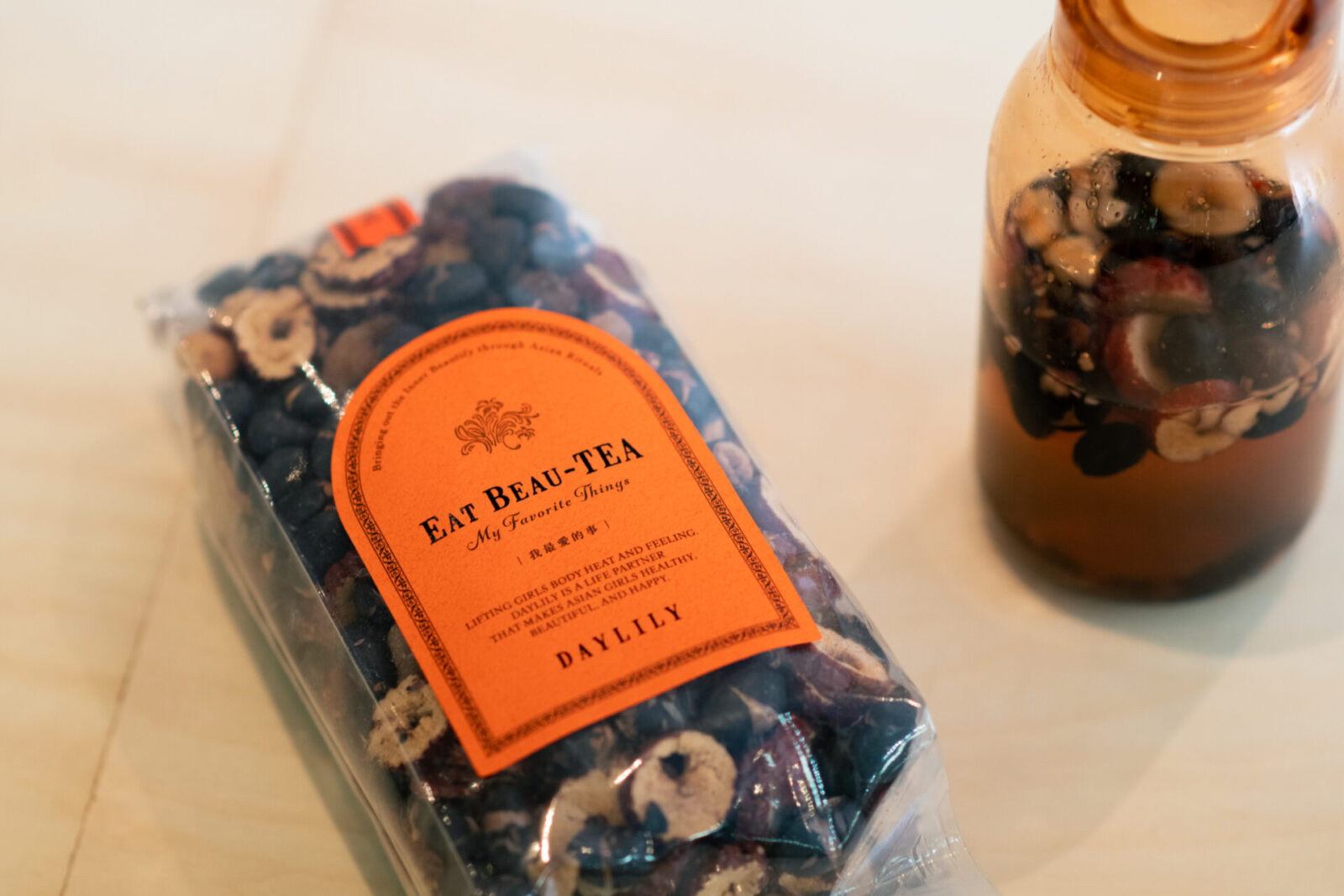
This inspired Wang and the Sisters to research ways of incorporating kampo in everyday life by making products that taste better and are easier to prepare.
For example, “My Favorite Things” is an edible kampo tea that contains jujubes, longan, and black beans. “Annin Beau-Tea” is a tea-style drink made from powdered apricot kernels. It is gaining popularity in Japan as an introductory product to Kampo because it is easy to prepare and delicious.
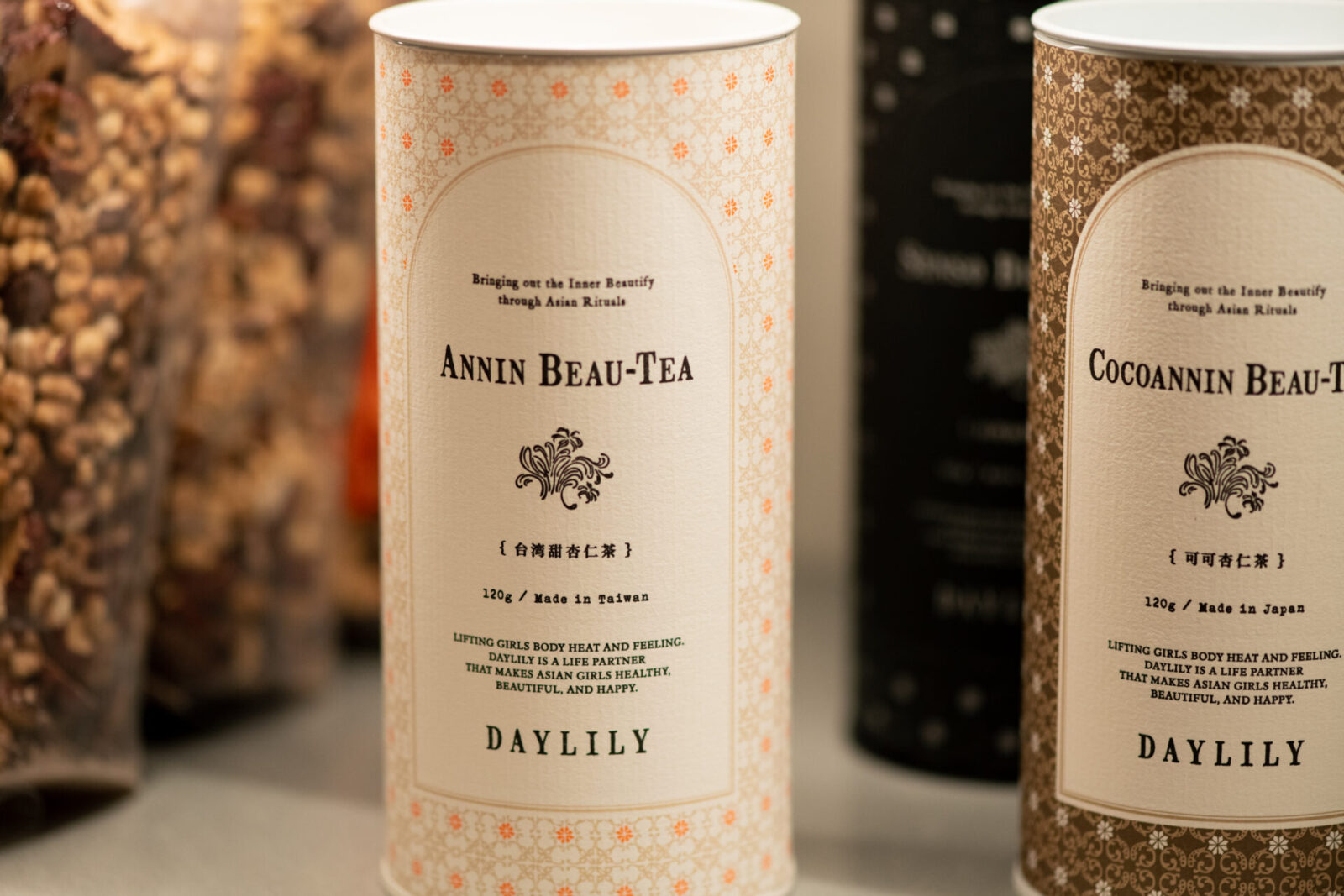
In order to create better tasting products for easier consumption, Daylily adds new ingredients to traditional kampo medicines and makes multiple prototypes through trial and error.
The ingredients for kampo are all bitter so the key is to find ways to mitigate the bitterness.
“We sometimes use cane sugar or rock sugar in our products, but it is difficult to find the right balance of sweetness. We often get asked why our products contain rock sugar. In fact, rock sugar is a traditional Kampo ingredient and it acts to moisturize the throat and body. This is why you can find large bags of rock sugar sold in Taiwanese pharmacies.”
Rethinking kampo through design
Another way Daylily is changing the preconception of kampo as being bitter is by renewing the designs for their products.
Working with designer Takeshi Kawano and Daylily co-founder Momoe Kobayashi, they have pursued a design that would inspire everyday use and be loved for a long time.
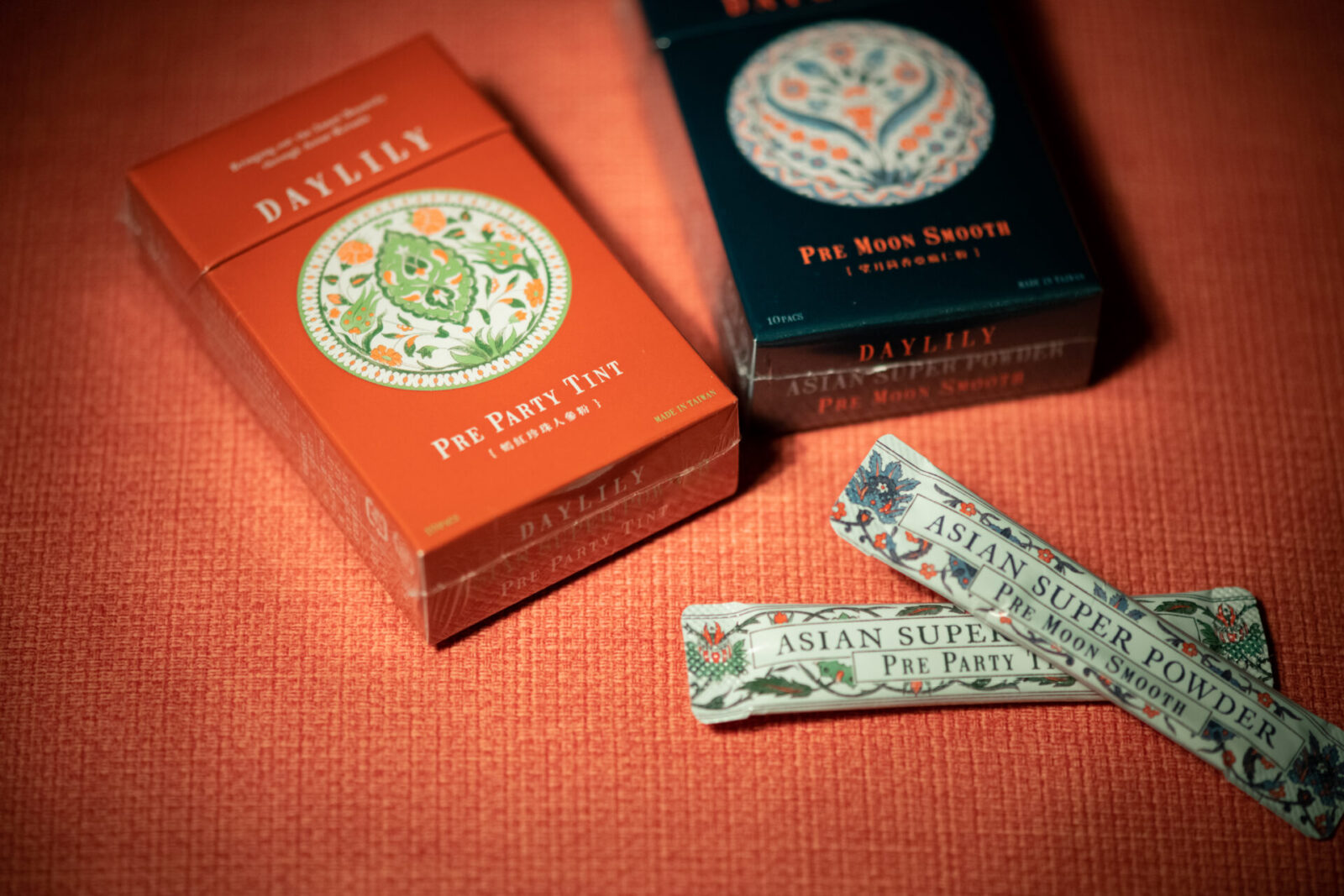
Other lifestyle products include tea canisters, measuring spoons and “Made in Taiwan” Chinese shoes. Daylily products inspire an ideal lifestyle for women through kampo.
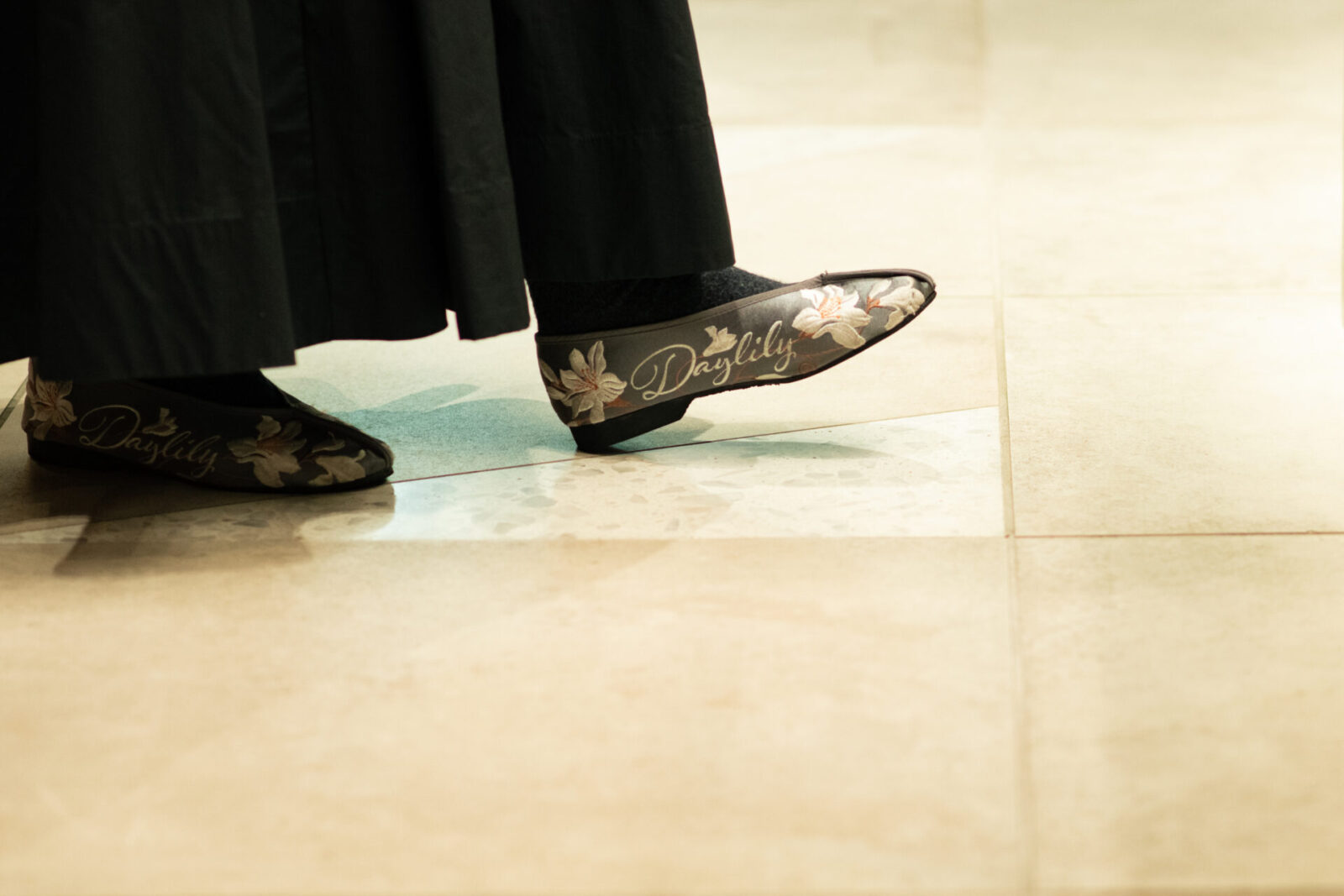
Kampo for menstrual health
Wang says that Taiwanese people are very surprised when they are served cold water with ice at restaurants in Japan.
In Taiwan, it is believed that cooling the body is bad for your health so they rarely drink ice cold water.
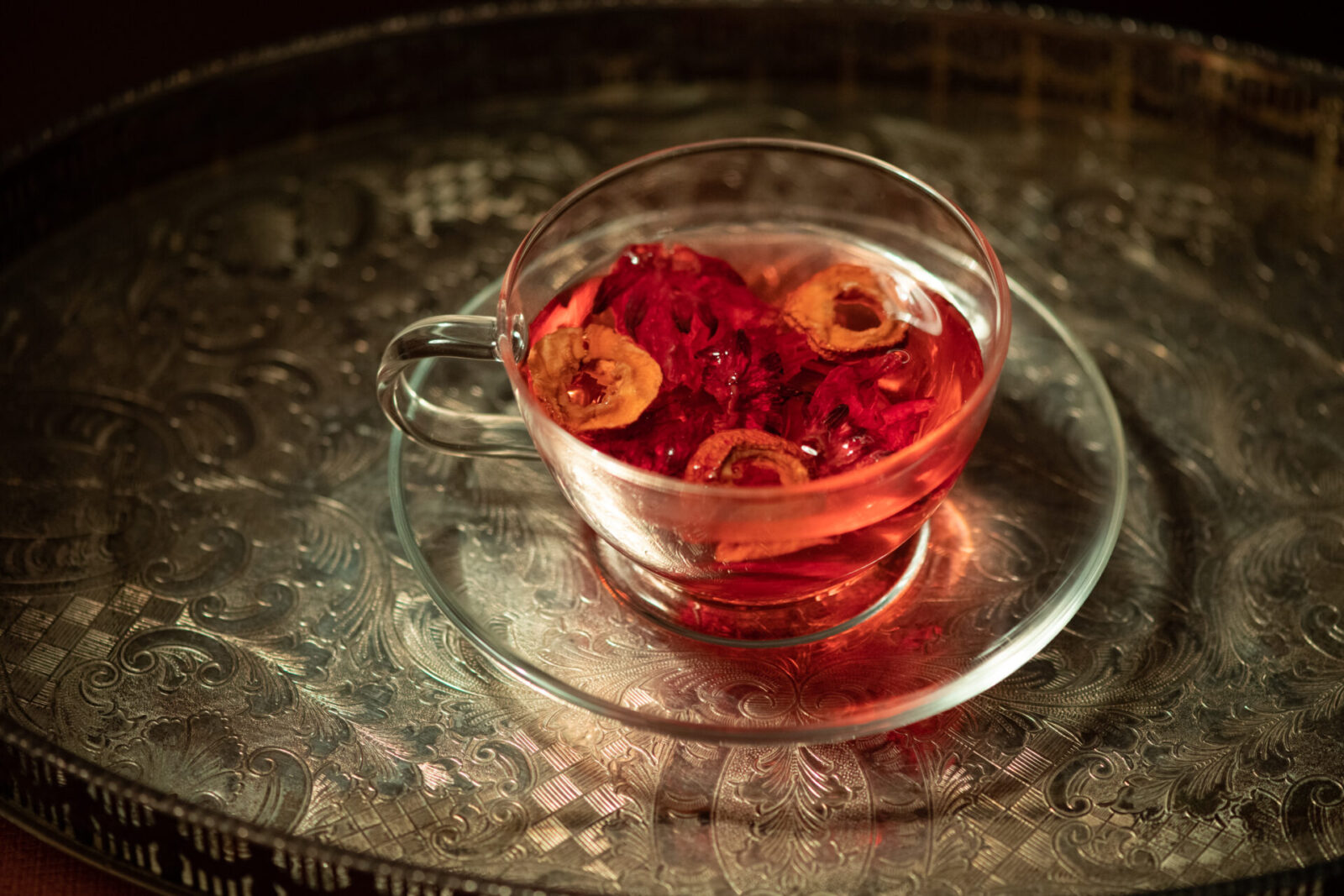
“Taiwanese women are especially careful not to cool their body during their menstrual cycle. We drink warm soups and brown sugar ginger drinks to keep our bodies warm.”
“One big difference I find between Japan and Taiwan is the men’s treatment of women during their period. Japanese men show very little concern for the women’s menstrual cycle, but in Taiwan, men show daily concern for the women’s body by bringing women warm tea or going out and buying sanitary products for them.”
Even though the understanding of women’s menstrual needs have improved among men in Japan in recent years, it is still only a minority of men who take action to care for women during their period.
Wang says that the reason why Taiwanese men naturally act to take care of a woman’s body comes from the fundamental value in their culture that believes one must take good care of their mother. Through caring for the health of their mothers, they have a deeper understanding of the menstrual cycle.
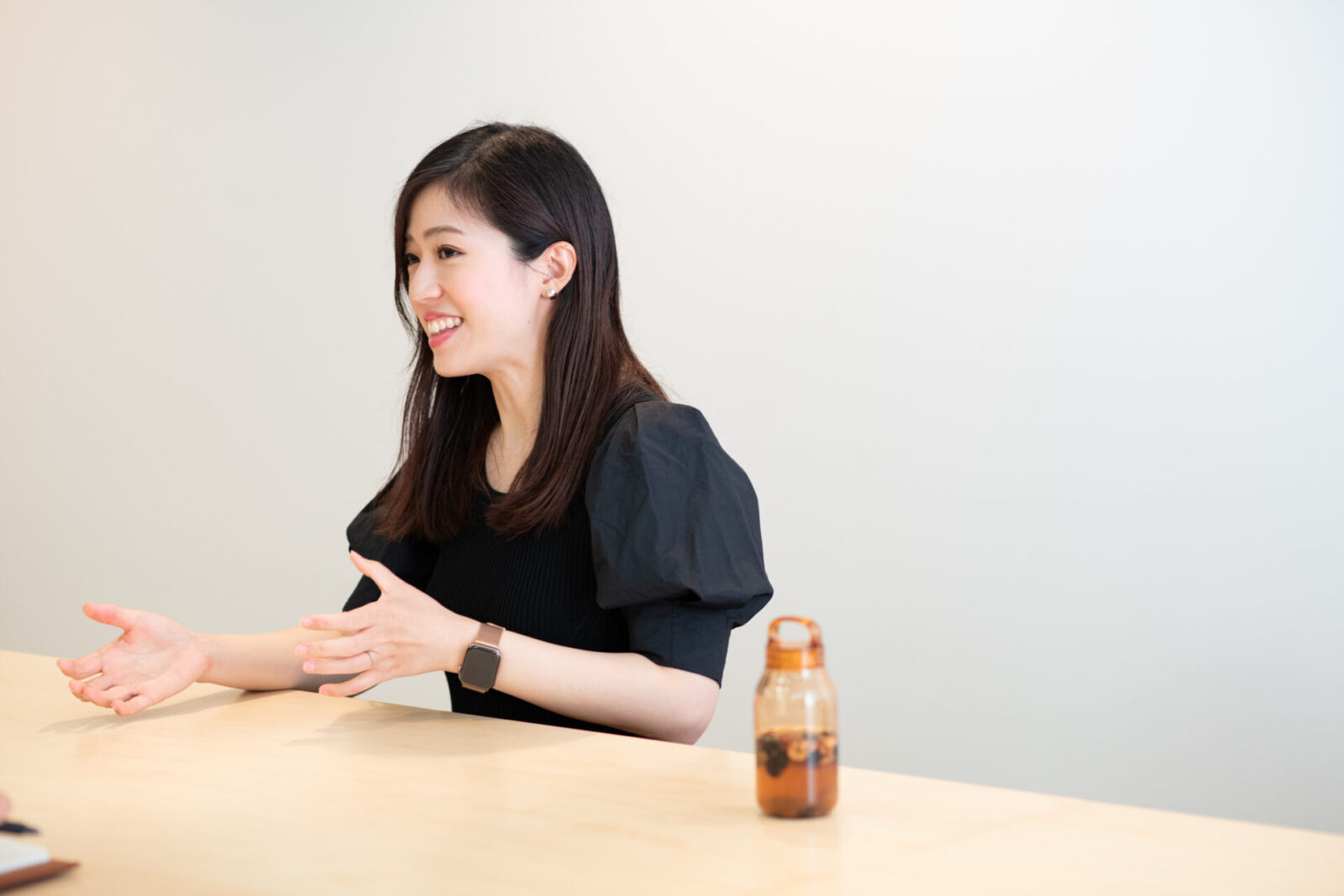
Family ties are also very strong in Taiwan and even if family members live far away from each other, they speak on the phone often.
“My mother, who lives in Taiwan, calls my Japanese husband every day. We believe it is important to hear each other’s voices and that helps us stay close even if we live far apart. Our mother would ask us if we slept well, or if we ate and other questions about our health. On the other hand, my husband only calls his mother in Japan about once a month.”
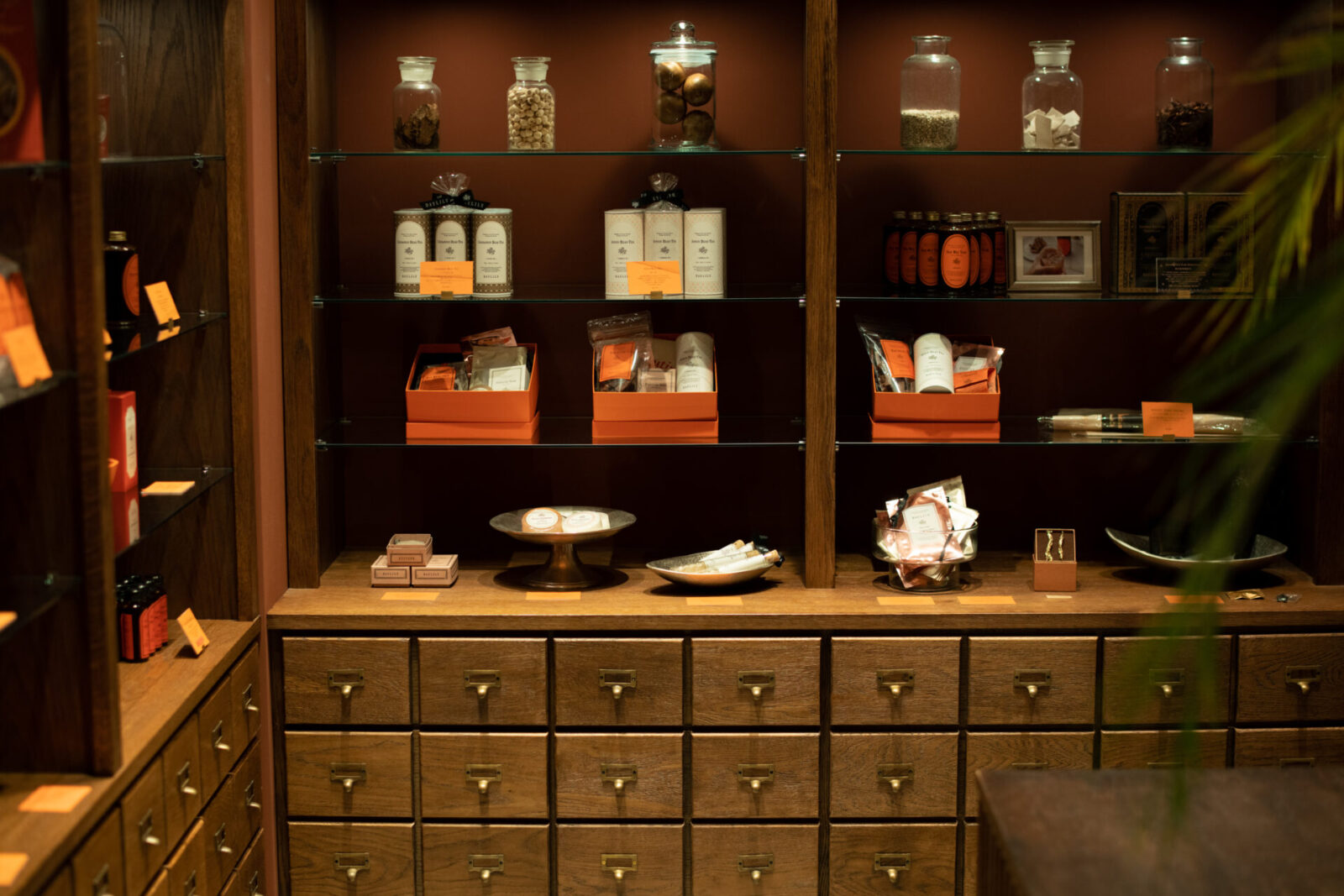
Wang says that in her daily conversations with her mother, there was a moment she discovered something about Taiwan’s kampo culture.
In 2022, Wang was busy preparing for the opening of Daylily’s new shop in Hakata when she started experiencing pain in her back.
“When I told my mother about the pain, she immediately said that it must be coming from my kidney and told me to get it checked at the hospital right away. At the hospital I found that there indeed was a problem with my kidney. Thankfully it was not a serious issue and I was able to treat it with kampo.”
“My mother had noticed through our conversations on the phone that I was so busy that I was not drinking enough fluids or going to the bathroom enough. Through my mother’s advice, I realized the importance of having conversations with our customers at Daylily.”
Although Japanese people tend to ignore minor ailments such as swelling, fatigue, menstrual pain and PMS in their busy daily lives, Taiwanese people use kampo to care for these ailments that are often found somewhere in between good health and illness.
There is a lot to learn from Taiwan’s values of staying connected with people and showing concern for family members’ health while using Kampo in everyday life.
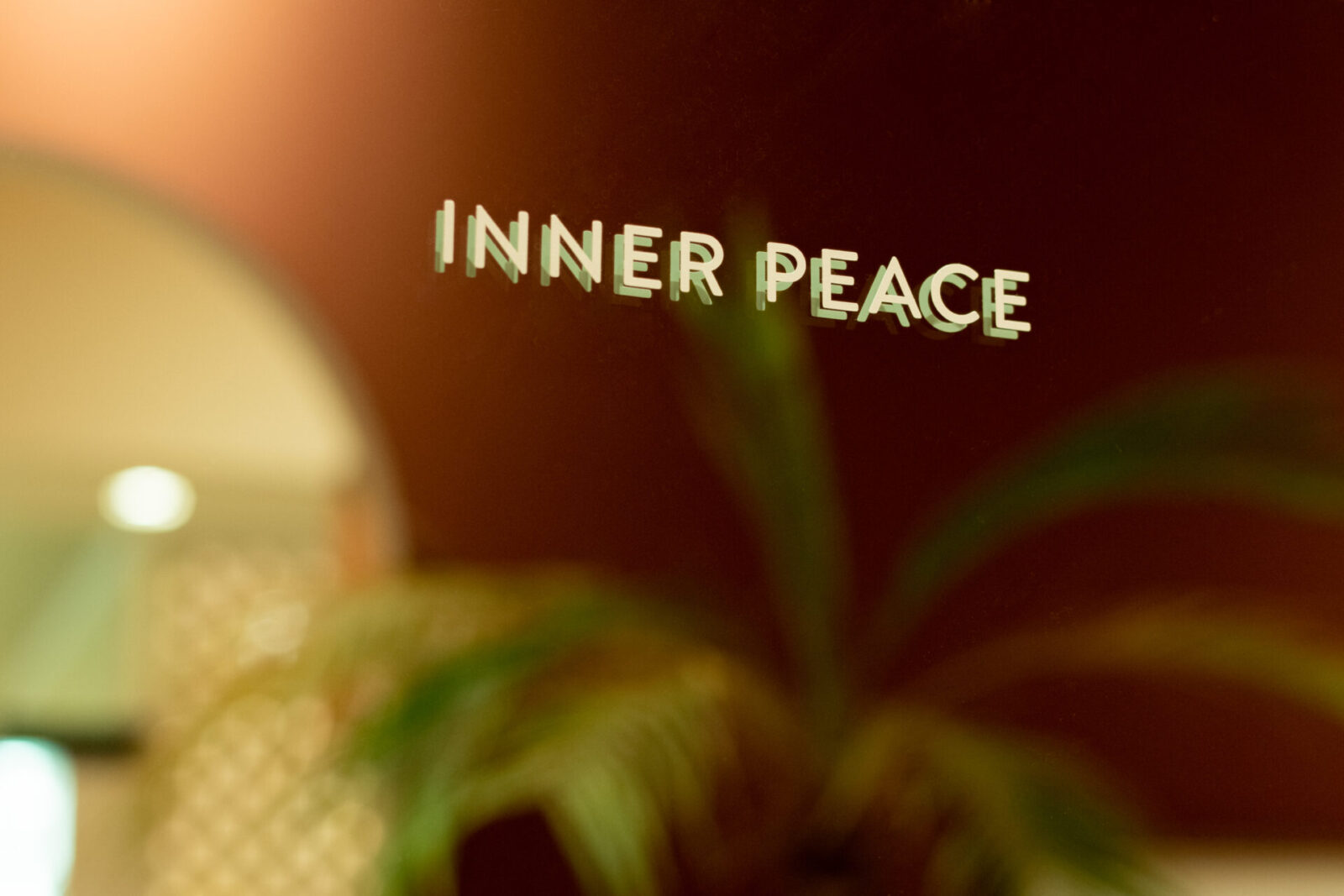
Take care of your mind as you do for you body
Wang is careful to take care of her mental health in the same way she cares for her physical health.
In Wang’s busy life, her moments of escape are found in the mountains. She loves mountain climbing and travels all around Japan to climb mountains on her days off. Wang says, “I am always thinking about the next mountain to climb.”
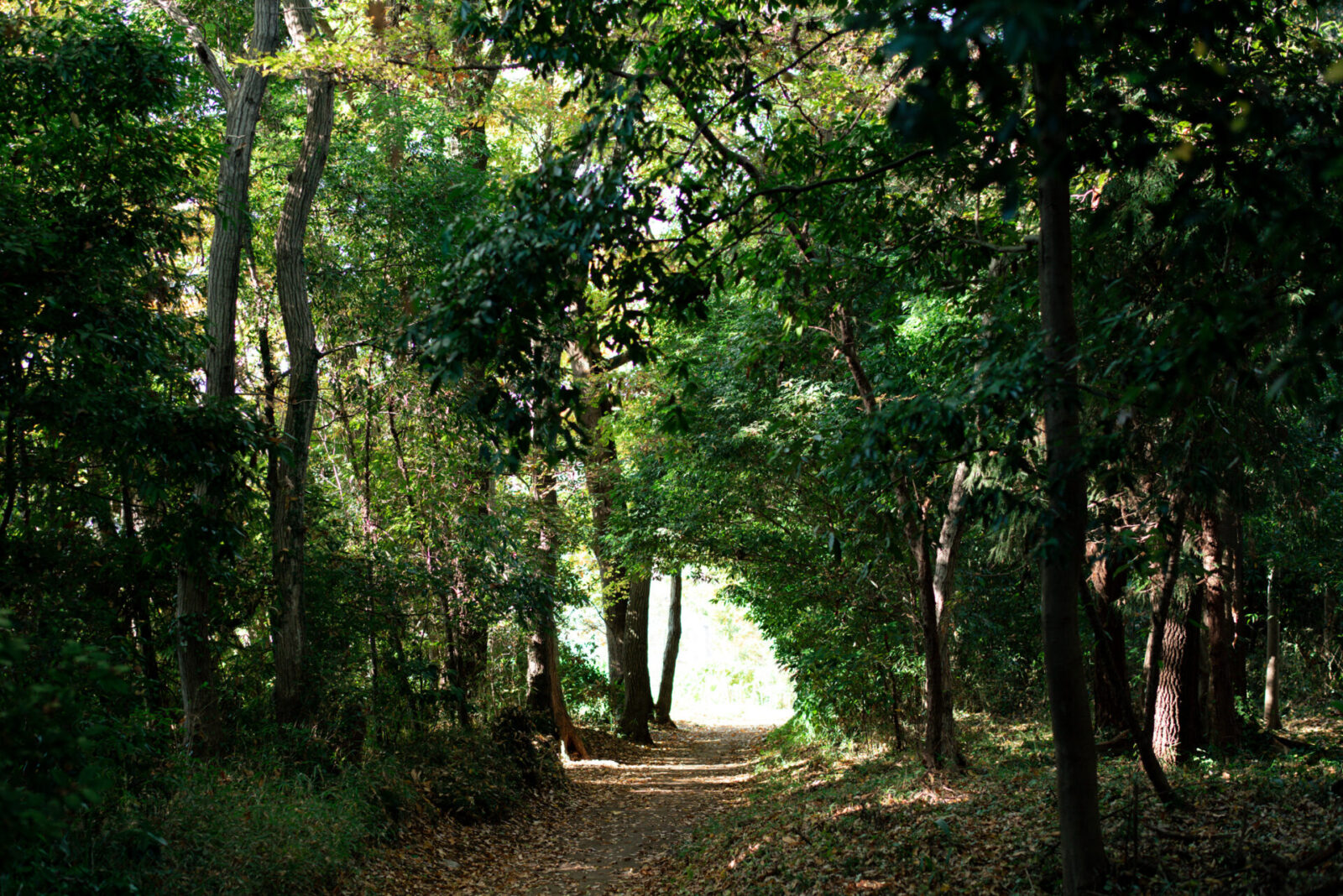
She says that after she finished working on the opening of the Daylily Hakata shop in Fukuoka, she set out to climb the Kuju Mountains.
Her time spent in the mountains provides her with moments that cannot be replaced in any other way.
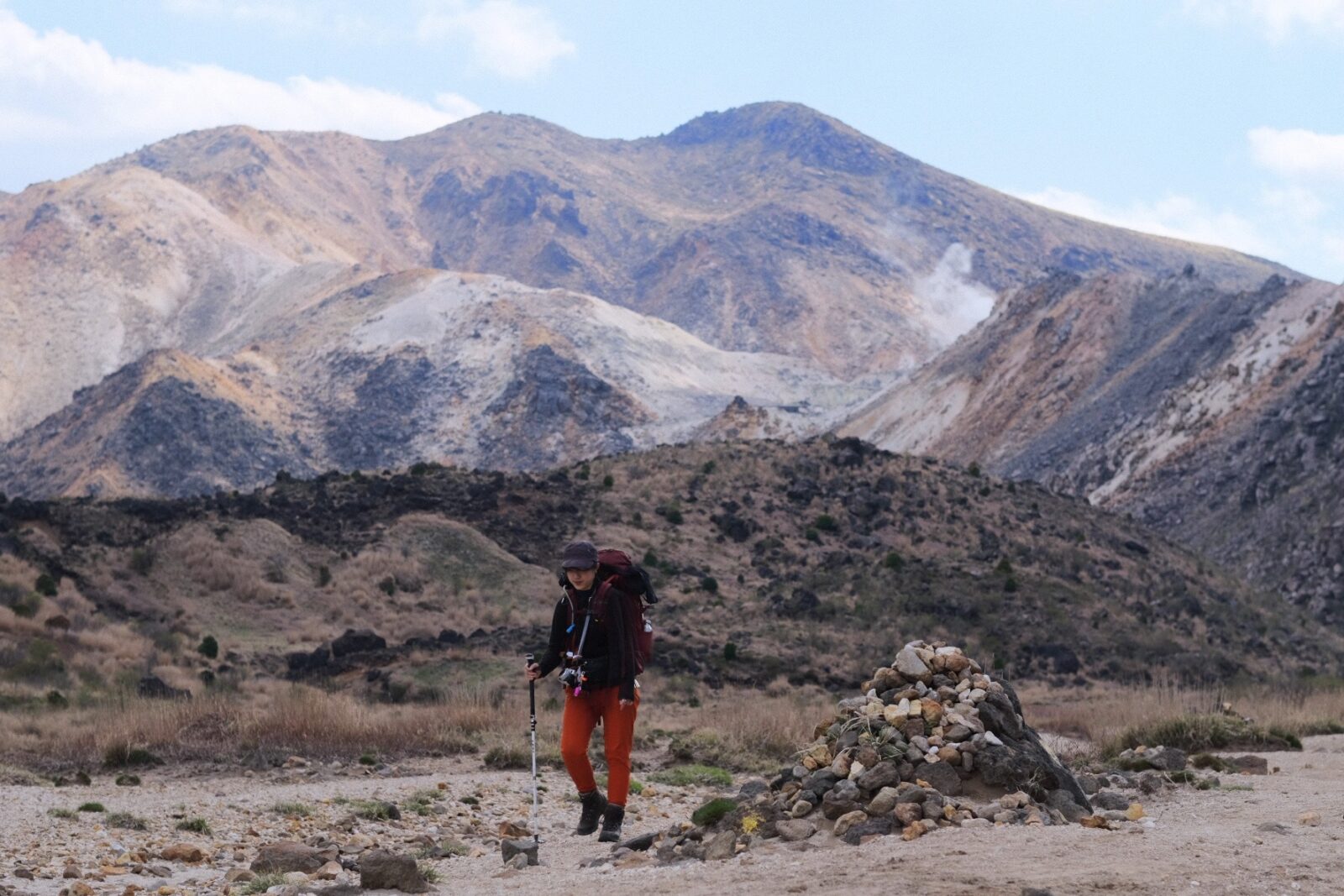
“My father also loved the outdoors and when I was a child he took me mountain climbing and camping often. I think that my love for mountain climbing is rooted in those experiences.”
“Climbing mountains allows me to think about a lot of things and when I am immersed in nature, my train of thought becomes more positive. Lately, I enjoy exploring ways to make healthy meals in the mountains. I take a lot of dried vegetables and mushrooms and make green curry or pasta on the mountain top. The meals, tea and coffee you have in the mountains are really exceptionally delicious.”
Spending quiet moments in nature, enjoying delicious food, and taking moments of self-reflection are all fruitful ways to spend time and have something in common with a lifestyle that incorporates kampo.
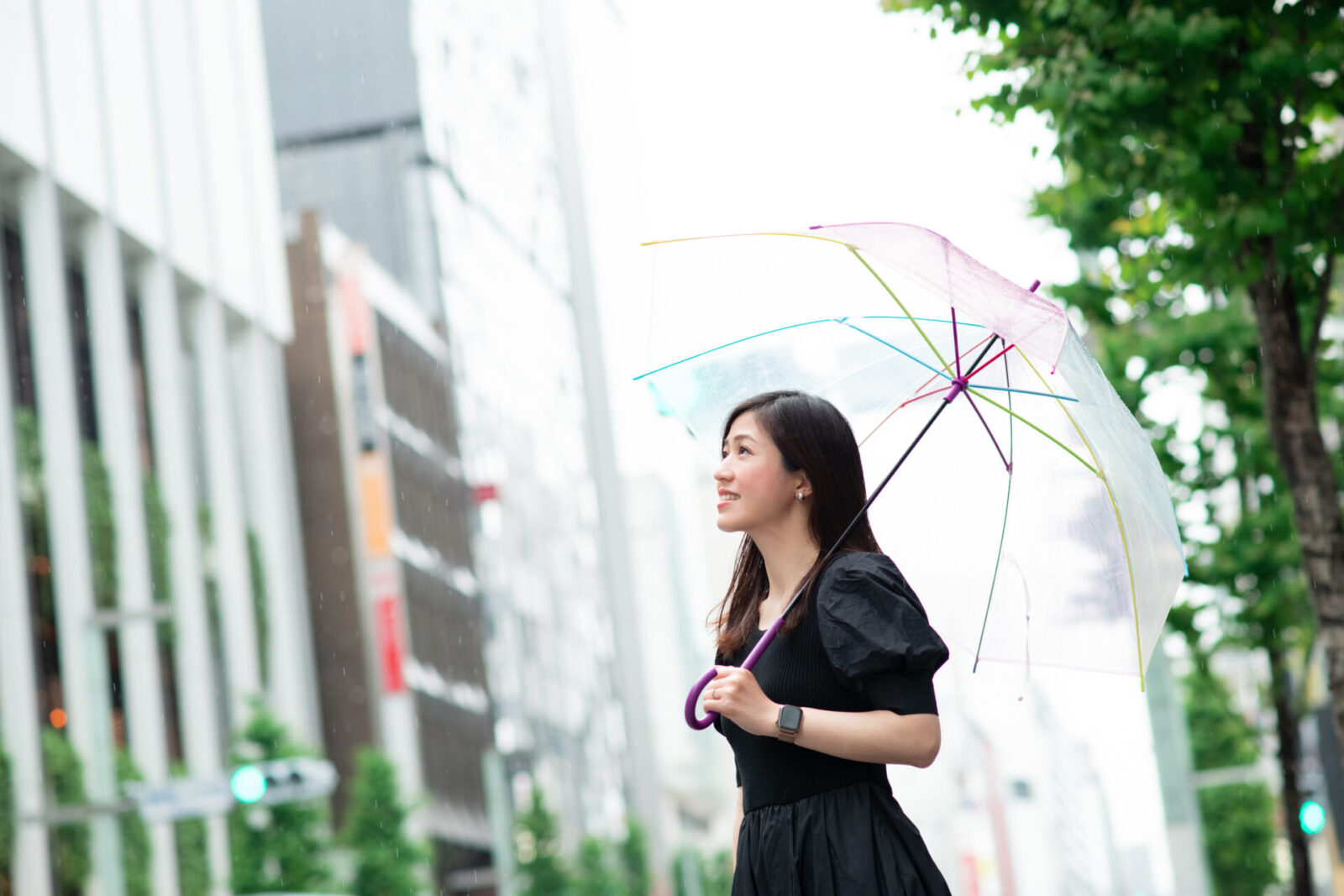
Born and raised in Taiwan, Wang is now on a mission to share and popularize kampo culture in Japan. For those of us who find that we are always being pushed for time, Daylily helps us incorporate self care and good health into our daily lives.
Photo:Yuko Kawashima
Translation: Sophia Swanson
Made her debut as a beauty writer for publisher Shogakukan’s “美的” (Biteki) while working as an actress in Lumine the Yoshimoto. After giving birth to her first son, she became a certified baby massage instructor. Currently appearing on TV shopping channel QVC as the PR representative for the cosmetics company Almado. Holder of HSK level 5 in Chinese language certification.
Editor. Born and raised in Kagoshima, the birthplace of Japanese tea. Worked for Impress, Inc. and Huffington Post Japan and has been involved in the launch and management of media after becoming independent. Does editing, writing, and content planning/production.
